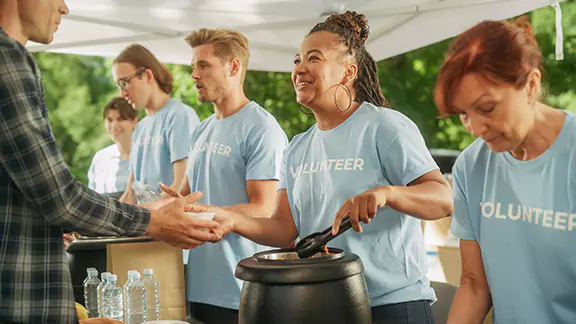Homelessness is a complex issue that affects hundreds of thousands of people in the United States every year. There are many reasons that someone may become homeless, such as financial hardship, a lack of affordable housing, and mental health issues.
Fortunately, support services are available to help homeless individuals and families as they work to regain stability and financial independence. These services range from emergency assistance, such as free and low-cost food and shelter, to more long-term solutions, like job training and help finding permanent housing. Keep reading to learn more about these incredibly vital services.
Housing Services
The most pressing need for homeless individuals and families is a safe place to sleep at night. When homeless people do not know where to seek help, they often end up living on the streets, where they are vulnerable to harsh weather and potential violence. Thankfully, many communities have facilities dedicated to helping those who are without housing and in need of shelter.
Emergency Shelters
An emergency shelter is a facility that provides immediate, short-term housing to individuals and families displaced by disasters or emergencies. These shelters aim to provide a secure and supportive environment until more permanent housing solutions can be arranged. In addition to a warm bed, they also provide guests with meals and other basic necessities.
Emergency shelters are typically managed by government agencies, non-profit organizations, or community-based organizations. They often operate on a first-come, first-served basis, and they may have specific rules and regulations regarding length of stay and expected conduct.
Transitional Housing Programs
Transitional housing programs help individuals and families moving from homelessness to stable, permanent housing. These programs offer temporary housing along with specialized services designed to address the root causes of homelessness, such as financial education, mental health services, and substance abuse counseling.
These programs usually last from several months to two years, giving residents the time they need to rebuild their lives. To be eligible for these programs, you typically need to verify homelessness or risk of homelessness, demonstrate low or no income, and pass a background check.
Rapid Re-Housing Programs
Rapid re-housing programs are designed to quickly connect individuals and families experiencing homelessness with permanent housing. Case managers work closely with participants to address barriers to housing, such as lack of income or poor credit history, and connect them with the proper support services.
Food Services
We all need food in order to survive, but many homeless individuals struggle to find a source of regular, nutritious meals. There are a variety of services dedicated to addressing this problem, such as soup kitchens and food drives. There is also financial assistance available to help low-income individuals afford groceries as they figure out their finances.
Soup Kitchens and Food Drives
Soup kitchens offer free hot meals to those in need. Besides offering food, some of these kitchens also provide hygiene supplies and social service referrals to connect individuals with other helpful resources in their community.
Along with soup kitchens, food drives also play an important role in combating hunger among low income and homeless populations. These are charitable events where non-perishable foods, such as canned goods, are distributed to members of the community.
Supplemental Nutrition Assistance Program (SNAP)
The Supplemental Nutrition Assistance Program, also known as SNAP, is a government assistance program that gives low-income individuals and families funds to purchase food. While SNAP is a federal program, each state has its own requirements and application process. To figure out if you qualify for benefits, contact your state or local SNAP office.

Health Care Services
Finding affordable health care services in the United States can be especially tricky for homeless individuals, as they often lack insurance coverage and do not have the financial resources to pay for care out of pocket. However, being homeless does not mean that you cannot access quality medical care. There are several options available for those who need care as they work towards housing stability.
Community Health Centers
Community health centers help the homeless by providing quality healthcare services that fit their unique needs. These facilities offer everything from primary care to mental health services to treatment for substance use disorders.
To keep care affordable, community health centers use sliding fee scales to determine the cost of services. This means based on a patient’s income and ability to pay. This helps make essential healthcare services more accessible to underserved populations, such as those experiencing homelessness.
Community health centers often collaborate with local agencies and social service organizations to connect homeless patients to other resources, such as housing assistance and case management, ensuring that homeless individuals receive the support they need.
The SAMHSA National Hotline
The Substance Abuse and Mental Health Services Administration (SAMHSA) is a federal agency that works to improve access to mental health services and support the treatment of people with mental illnesses and substance use disorders. SAMHSA’s National Helpline provides free, confidential, 24/7 assistance to individuals struggling with these issues. They can offer information, support, and treatment referral services in both English and Spanish.
SAMHSA also has an online treatment locator available to help people with mental illness or substance use issues find treatment services in their area. This can be a helpful tool for learning about low-cost community resources.
Medicaid
Medicaid is a joint federal and state program that provides health coverage to low-income individuals and families, including the homeless. Through Medicaid, homeless individuals can receive a wide range of medical services, including primary care, mental health services, and preventive care. Those on Medicaid are often placed on a plan that allows them to receive care at local hospitals and health clinics.
Eligibility and enrollment varies by state. To learn who you need to contact to apply for Medicaid, visit this website. You can also contact your local department of public health for more information on Medicaid in your community.
Legal Assistance
Homeless people may need legal assistance for a variety of issues, such as securing housing, obtaining public benefits, and resolving disputes with landlords. Legal aid organizations recognize this and offer free or low-cost legal services to homeless individuals.
These organizations can assist with issues such as evictions, obtaining identification documents, resolving criminal records, and more. They often partner with shelters or legal aid organizations to offer their services to individuals and families at these facilities.
Financial Assistance
Since a lack of housing often stems from financial instability, having some form of income is essential to gaining housing stability. Thankfully, there are some public benefits available for those struggling with homelessness. Keep in mind that while these benefits can be very helpful, they may not be sufficient enough to sustain an individual or family over a long period of time.
Social Security Benefits
Homeless individuals may be eligible to receive Supplemental Security Income (SSI) or Social Security Disability Insurance (SSDI). SSI is a program that provides monthly payments to those with limited income or who are elderly, blind, or disabled. SSDI provides monthly payments to those who have worked in the past and paid Social Security taxes but are now unable to work due to a disability.
Both of these benefits can help homeless people who cannot work due to a medical impairment or serious mental illness. For more information on these benefits and how to apply for them, visit the Social Security Administration’s website.
Temporary Assistance for Needy Families
Temporary Assistance for Needy Families, or TANF, is a federal program designed to help low-income families reach self-sufficiency. The program gives temporary financial assistance to eligible families with dependent children, offering support for needs such as food, housing, and utilities.
TANF has work requirements and offers services like job training and childcare assistance. This helps participants find their footing in the workforce and eventually transition off of public assistance. This allows homeless adults to look out for their families while gaining valuable experience that can help them build a successful career for themselves.
The program is administered at the state level, which means states determine their own eligibility guidelines. For more information on whether you qualify, take a at look at this webpage.
Thanks to nonprofit organizations, government agencies, and community groups, there are a wide range of support services available to help those experiencing homelessness meet their needs and long-term goals. By taking advantage of the resources described here, homeless individuals and their families have a better chance of transitioning out of homelessness and achieving lasting stability.


